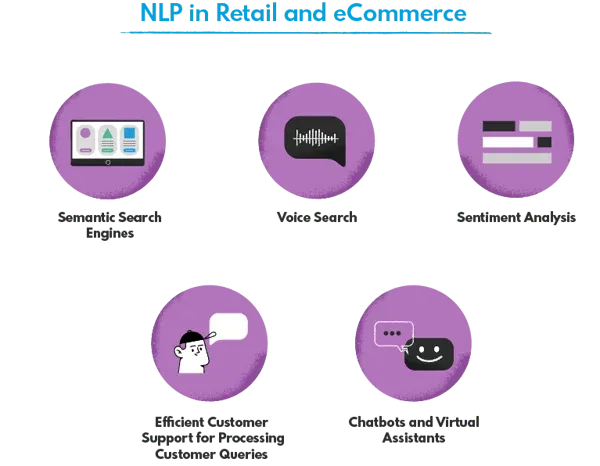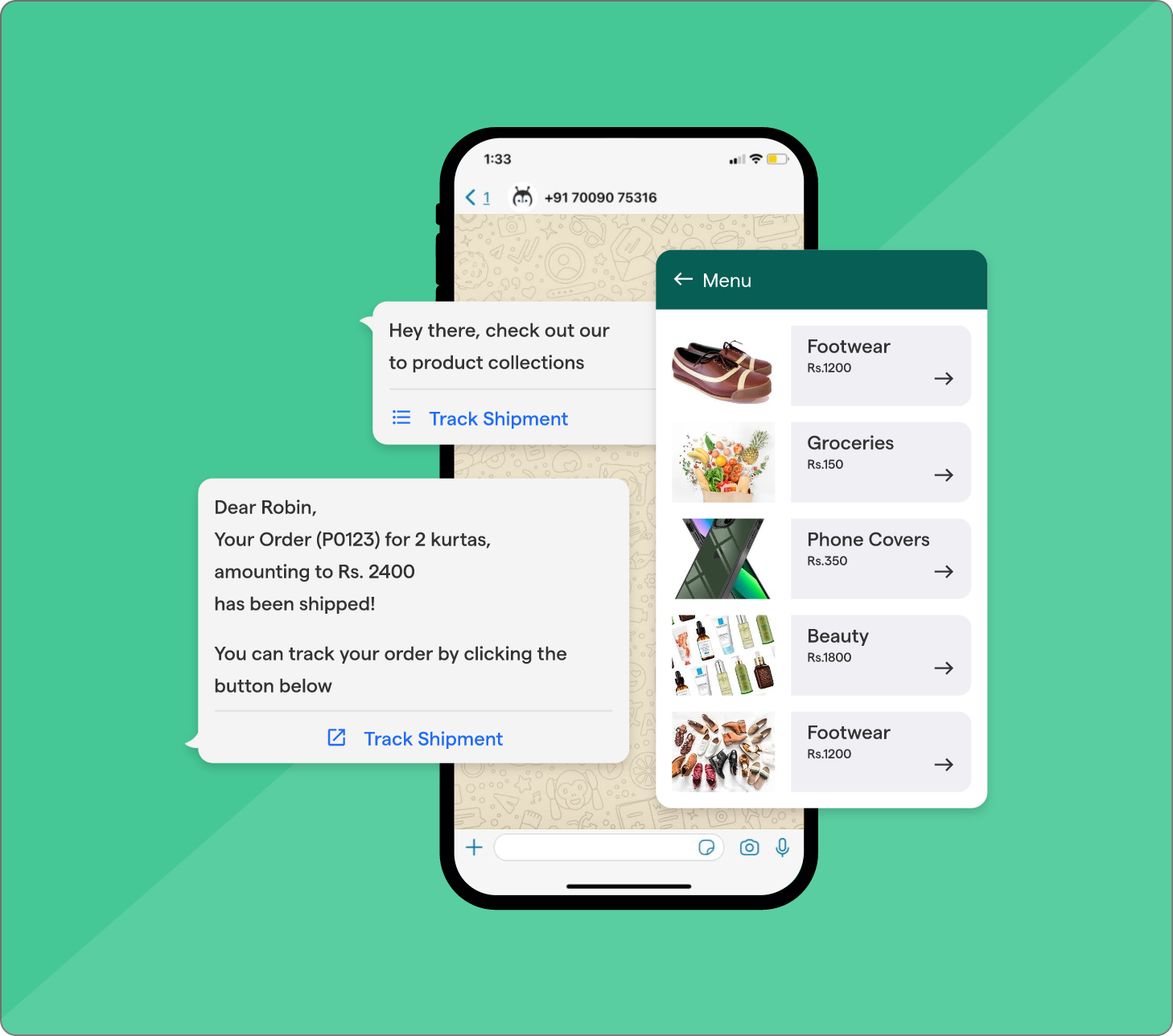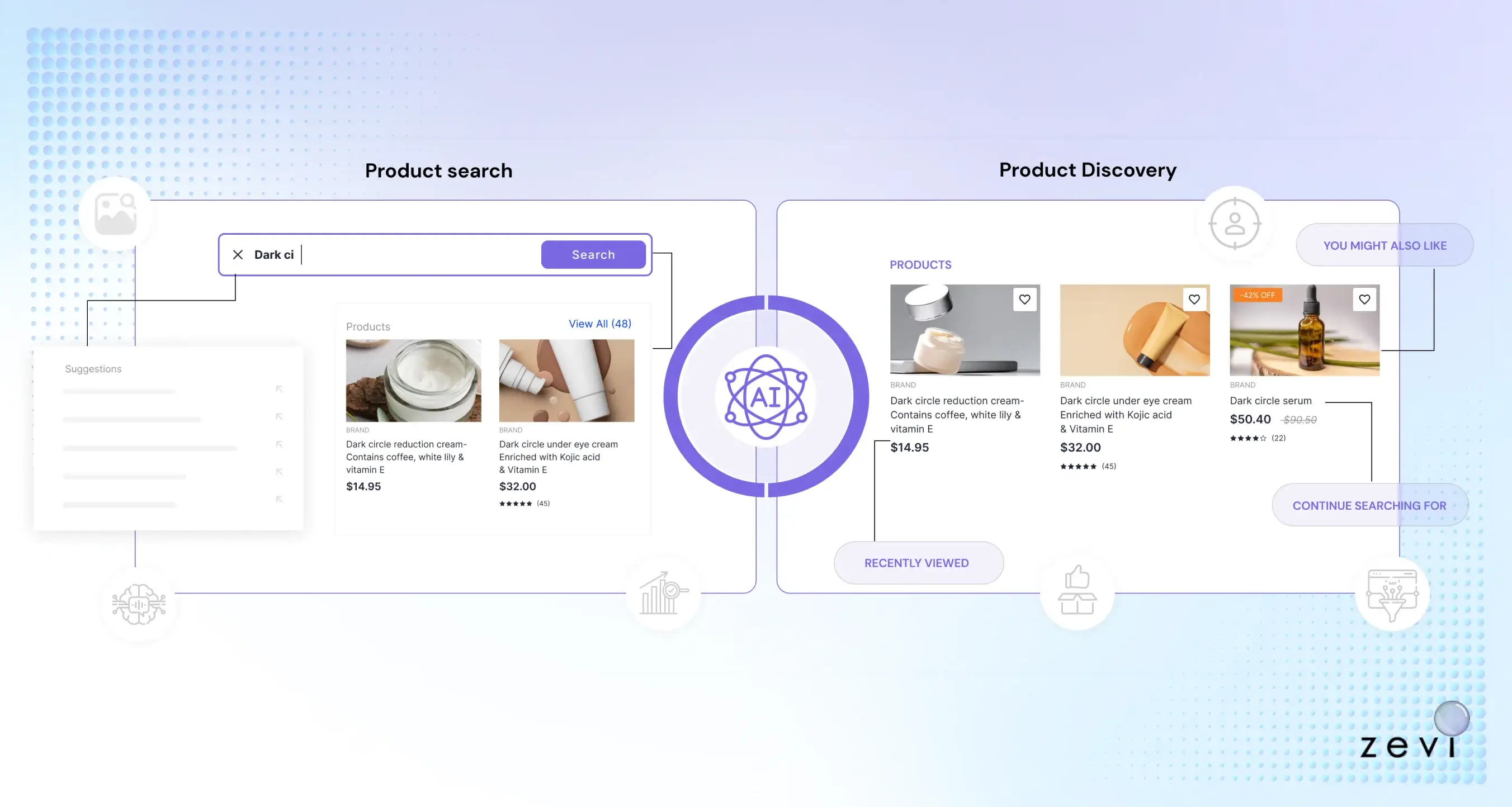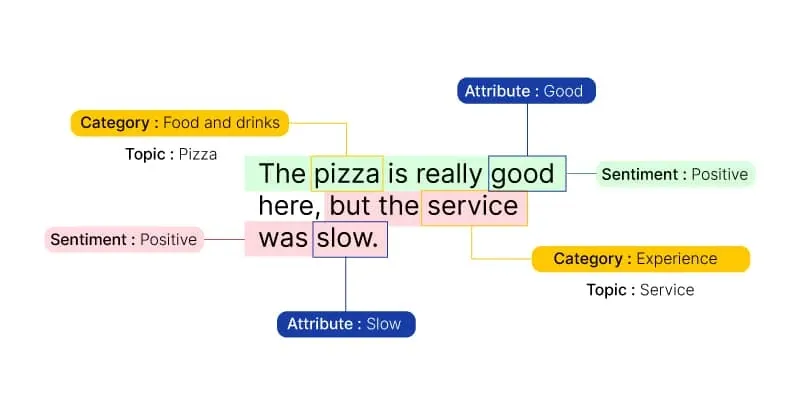In the world of online shopping, things are getting a major upgrade, all thanks to something called Natural Language Processing (NLP). This fancy tech is bringing AI chatbots into the e-commerce scene, making it all about chatting with customers.
Imagine having a friendly chat with a robot while shopping online – that's the magic of it.
Guess what? The global chatbot market is expected to hit a whopping $1.3 billion by 2024, showing how big a deal these talking bots are becoming.
Whether you're selling tech stuff to big companies or just starting your online store, understanding how NLP and chatbots work can give you a serious edge. It's the ultimate tool to stand out in the crowded online business world. So, let's dive into how NLP is shaking up the e-commerce game!
Enhancing Customer Experience with NLP in eCommerce
Enhancing the customer experience in e-commerce, Natural Language Processing (NLP) enables personalized product recommendations based on customer behavior. It implements intelligent chatbots and virtual assistants for improved customer support and facilitates effortless shopping experiences through voice assistants and voice search.
NLP-driven algorithms analyze customer data to provide personalized recommendations, while chatbots and virtual assistants understand and respond to customer queries effectively.
Voice assistants and voice search offer hands-free shopping experiences by understanding natural language queries and providing relevant information and recommendations.

Personalized recommendations based on customer interaction and past behavior
One of the most significant ways that NLP improves customer experience in e-commerce is through personalized recommendations. NLP algorithms can analyze vast data about a customer's past behavior, browsing history, and purchase patterns to deliver highly personalized suggestions for products and services.
This personalized experience can significantly enhance customer satisfaction, increase loyalty, and boost sales.
NLP-powered recommendation systems can also make complementary product recommendations, offering customers related items that may interest them, driving upsell and cross-sell opportunities.
Chatbots and Virtual Assistants for Improved Customer Support

Another exciting use of NLP in e-commerce is through intelligent chatbots and virtual assistants. These tools can help customers get quick answers to their queries, provide personalized assistance, and improve the overall customer experience.
By leveraging NLP algorithms, chatbots and virtual assistants can analyze and understand customer queries, provide relevant answers, and generate appropriate follow-up questions, allowing businesses to engage with customers more effectively.
Chatbots and virtual assistants can also be available 24/7, reducing customer wait times and enhancing customer service.
And beginning with NLP powered chatbot isn't that tough. Meet BotPenguin- the home of chatbot solutions.
With BotPenguin you can easily train your chatbot on custom data, paint them with your logo and branding, and offer human-like conversational support to your customers.
And that's not it. BotPenguin makes sure that you reach your customers where they are by offering AI chatbots for multiple platforms, thus making omnichannel support look easy:
- WhatsApp Chatbot
- Facebook Chatbot
- WordPress Chatbot
- Website Chatbot
- Squarespace Chatbot
- woocommerce Chatbot
- Instagram Chatbot
Voice Assistants and Voice Search for Effortless Shopping Experiences
Voice assistants and voice search are rapidly gaining popularity in the e-commerce industry, helping customers simplify shopping while offering a hands-free and personalized shopping experience.
With NLP, voice assistants and voice search can understand natural language queries and respond with relevant product information and recommendations.
This makes voice search an easy and convenient way for customers to find products and services without physically scrolling through pages of search results on their mobile device or computer.
Additionally, voice assistants can be integrated with smart devices such as smart homes and IoT devices, providing a seamless and effortless shopping experience for the user.
Optimizing Search Results with NLP
Optimizing search results with NLP involves understanding search intent to provide relevant results, implementing semantic search for accurate recommendations, and using natural language understanding for advanced search queries and filters.
Understanding Search Intent and Providing Relevant Search Results
NLP plays a crucial role in optimizing search results in e-commerce by understanding the user's search intent. NLP algorithms can analyze and interpret the context, semantics, and intent behind customer search queries.
This enables e-commerce platforms to provide more accurate and relevant search results, increasing the chances of customers finding what they are looking for quickly.
For example, NLP can understand that a search query for "black dress" might have different intents, such as finding a specific style, brand, or occasion.
By understanding the intent, e-commerce platforms can deliver tailored search results matching the customer's needs.
Implementing Semantic Search for Accurate Product Recommendations
Semantic search, powered by NLP, goes beyond traditional keyword-based search by considering the meaning and context of words. This approach allows e-commerce platforms to provide accurate and relevant product recommendations based on customer search queries.
For example, if a customer searches for "comfortable running shoes," semantic search algorithms can understand that the customer is looking for shoes that prioritize comfort for running.
By incorporating such NLP-driven semantic search capabilities, e-commerce platforms can enhance the accuracy and quality of product recommendations and improve the overall search experience for customers.
Natural Language Understanding for Advanced Search Queries and Filters
NLP also enables advanced search queries and filters by understanding natural language inputs. Instead of limiting users to predefined search options, NLP algorithms can decipher and interpret complex search queries in everyday language.
This capability allows customers to search for products using natural language, such as "blue dresses for summer under $50," and obtain accurate and relevant results.
Additionally, NLP-powered filters enable users to refine their search dynamically, allowing them to explore and narrow down their options based on specific criteria like size, color, price range, and more.
By leveraging NLP for advanced search queries and filters, e-commerce platforms can offer a more intuitive and user-friendly search experience, improving customer satisfaction and conversion rates.
Suggested Reading:
Automating Processes with NLP in e-Commerce

Automating processes with NLP in e-commerce allows businesses to streamline order processing and fulfillment, optimize inventory management and supply chain operations, and gain valuable insights from customer feedback.
This automation improves operational efficiency and enhances the overall customer experience, increasing customer satisfaction and loyalty.
Automated Order Processing and Fulfillment
NLP plays a significant role in automating order processing and fulfillment in e-commerce.
By leveraging NLP algorithms, businesses can automatically extract and interpret order information from customers' input, such as emails, forms, or chat conversations.
This automation allows for seamless and efficient processing of orders, reducing the likelihood of errors and improving the speed of order fulfillment.
NLP can extract crucial information like product names, quantities, shipping addresses, and payment details, enabling businesses to automate the entire order management process and provide a smoother experience for customers.
NLP-Powered Inventory Management and Supply Chain Optimization
NLP is also utilized in e-commerce for inventory management and supply chain optimization.
NLP algorithms can extract insights and make intelligent predictions about product demand by analyzing data from various sources like sales records, customer reviews, and market trends.
This information allows businesses to optimize inventory levels, ensuring that popular products are always in stock while minimizing excess inventory.
NLP can also analyze supplier data, helping businesses make data-driven decisions regarding supplier selection, pricing, and lead times.
With NLP-powered inventory management and supply chain optimization, e-commerce businesses can improve efficiency, reduce costs, and enhance customer satisfaction.
Automated Customer Feedback Analysis for Sentiment Analysis and Improvement
NLP is valuable for automating the analysis of customer feedback and sentiment in e-commerce.
NLP algorithms can automatically analyze customer reviews, social media comments, and feedback surveys to understand customer sentiment towards products, services, and the overall shopping experience.
This sentiment analysis gives businesses insights into customer satisfaction levels, identifies areas for improvement, and helps prioritize customer-centric initiatives.
With automated customer feedback analysis, e-commerce businesses can respond quickly to customer concerns, address issues promptly, and continuously enhance the customer experience based on actionable insights derived from NLP analysis.
Suggested Reading:
Driving Sales Through NLP in E-commerce
NLP is valuable for driving sales in e-commerce by providing sentiment analysis to understand customer preferences and feedback. Personalized marketing messages that resonate with individual customers and recommendation systems for upselling and cross-selling opportunities.
By leveraging NLP insights, e-commerce businesses can enhance the customer experience and increase sales, leading to improved revenue and customer loyalty.
Sentiment Analysis for Understanding Customer Preferences and Feedback

NLP is essential for understanding customer preferences and feedback through sentiment analysis. NLP algorithms can analyze customer feedback across various channels to determine their overall sentiment towards products, services, and the shopping experience.
Using these insights, e-commerce businesses can tailor their offerings and improve the customer experience to meet their preferences better. Businesses can also use sentiment analysis to identify and address negative feedback promptly.
By utilizing NLP-powered sentiment analysis, e-commerce businesses can gain valuable insights into customer's needs and preferences, leading to increased sales and customer loyalty.
Personalized Marketing Messages Based on NLP insights
NLP is utilized for personalized marketing in e-commerce, tailoring marketing messages to individual customers based on their interests, preferences, and browsing behavior.
NLP-powered algorithms can analyze customer data, including purchasing history, search queries, and website behavior, to understand customer preferences and create personalized marketing messages that resonate with them.
This ability to personalize marketing efforts increases the likelihood of customers purchasing.
Additionally, NLP can determine the most effective messaging and marketing channels, optimizing marketing efforts to drive sales effectively.
Recommendation Systems for Upselling and Cross-Selling Opportunities
NLP can also be used for product recommendations, providing upselling and cross-selling opportunities.
NLP-powered recommendation systems can analyze customer behavior and purchasing data to understand their preferences and recommend products that complement or enhance their current purchase.
This capability increases the likelihood of customers making additional purchases, improving revenue and customer satisfaction.
Additionally, NLP can be used to optimize the timing and format of recommendations, making them more effective in driving sales.
Conclusion
Businesses nowadays must be adaptable to new ideas to keep their place in the market. Early adopters of conversational marketing chatbots see better customer loyalty and sales growth.
Chatbots in e-commerce aim for exceptional customer experiences. But using old methods only gets average satisfaction from customers.
Happy customers come from great experiences. That's where conversational chatbot marketing shines.
Online sellers want to make customers happier. Unhappy customers don't come back. So, knowing if customers are happy is crucial. Chatbot marketing lets customers share feelings, helping businesses understand and care for them.
Try BotPenguin to see how it transforms your customer conversations with its unique features.
Suggested Reading:
Frequently Asked Questions (FAQs)
What is NLP, and how is it used in e-commerce?
NLP, or natural language processing, is a part of AI that helps machines understand human language. In e-commerce, NLP powers various applications like customer service automation, sentiment analysis, and personalized marketing.
What are the benefits of NLP in e-commerce?
NLP benefits e-commerce in multiple ways. It improves customer experiences, streamlines operations, boosts revenue with personalized marketing and provides insights into customer preferences.
How does NLP help e-commerce businesses improve customer service?
NLP-driven chatbots and virtual assistants in e-commerce quickly and accurately address customer queries, gathering data for prompt feedback responses.
What is sentiment analysis, and how does NLP apply it in e-commerce?
Sentiment analysis, a part of NLP, gauges customers' feelings about products and services. This helps businesses enhance quality, service, and overall satisfaction.
Can NLP be used for personalized marketing in e-commerce?
Yes, NLP is used for personalized marketing in e-commerce. Analyzing customer data like browsing history tailors marketing messages, making them more effective in boosting sales.
What advancements in NLP are expected to shape the future of e-commerce?
Future e-commerce trends with NLP involve predictive analytics, voice-assistant devices, and intelligent chatbots. These advancements will continue personalizing offerings, streamlining operations, and boosting business sales.

